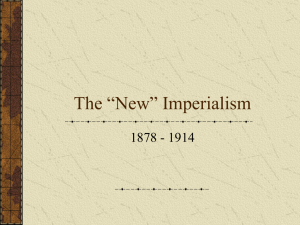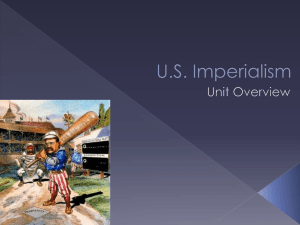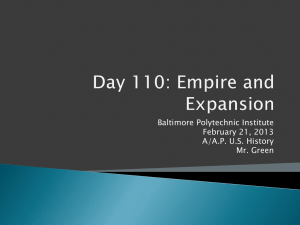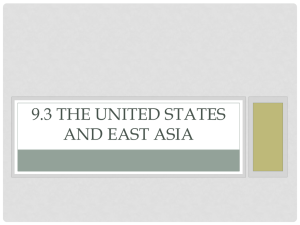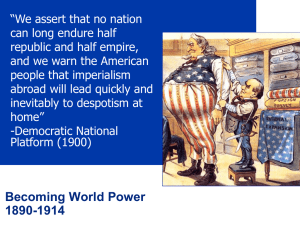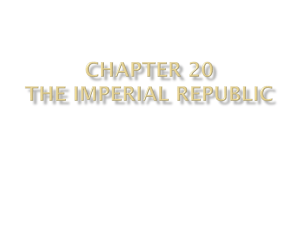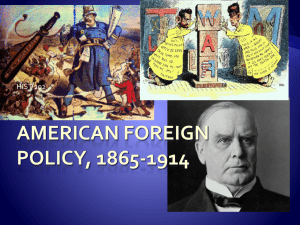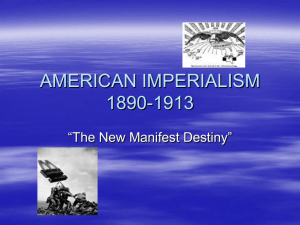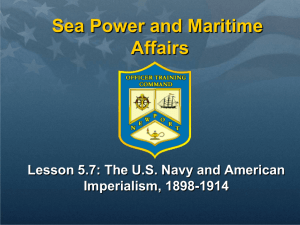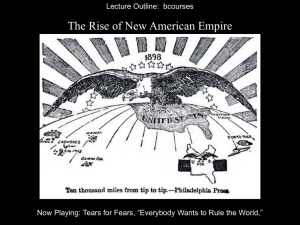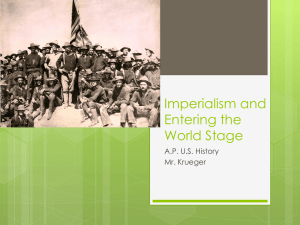Chapter 27 Notes - Twinsburg Schools
advertisement
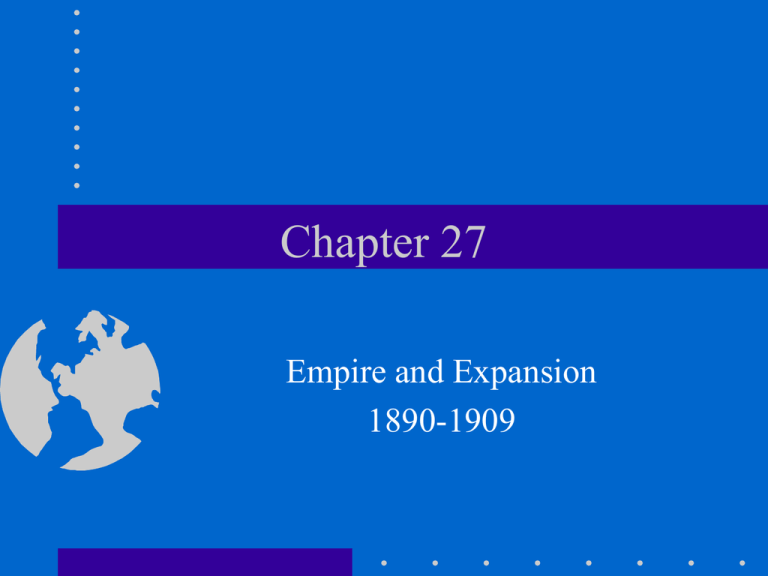
Chapter 27 Empire and Expansion 1890-1909 The Imperial Menu A pleased Uncle Sam gets ready to place his order with headwaiter William McKinley. Swallowing some of these possessions eventually produced political indigestion. Imperialism • America wanted to expand • Spurred by yellow journalism and missionaries • Social Darwinism • The Influence of Sea Power Upon History by Alfred Thayer Mahan 1890 • James G. Blaine and the Big Sister PolicyPan American Conference 1889 Great Britain vs. Venezuela • Boundary issue between British Guiana and Venezuela- gold discovered there • US letter sent by Secretary of State Richard Olney to GB (Monroe Doctrine) • GB= mind your own business • On the brink of war, but issue calmed down (anger redirected at Germany) • GB= arbitration, Monroe Doctrine enhanced • Great Rapprochement They Can’t Fight Britain and America waged a war of words during the Venezuelan boundary dispute, but cooler heads prevailed. A new era of diplomatic cooperation between the two former foes dawned, as they saw themselves bound together by ties of language, culture, and mutual economic interest. As the German chancellor Otto von Bismarck reportedly remarked, “The supreme geopolitical fact of the modern era is that the Americans speak English.” Hawaii • Hawaii= long been desired by US • 1887: naval base at Pearl Harbor • Problems arose with McKinley Tariff 1890 bad for US sugar companies • Annexation! Blocked by Queen Liliuokalani and Grover Cleveland • Would remain a “republic” for 5 years before annexation in 1898 Queen Liliuokalani (1838– 1917) Cuba • 1895: Cuban revolt against Spain • Insurrectos used scorched earth • US business!= $50 million + $100 million/year in trade • Spanish General Weyler (Butcher) • Cleveland= anti-imperialist, anti-jingoist The Maine • Yellow journalism- Hearst and Pulitzer • 1898 the Maine sent to Havana harbor • February 15, 1898: Maine exploded in Havana harbor • 2 investigations= Spanish and American conclusions • “Remember the Maine!” The Explosion of the Maine, February 15, 1898 Encouraged and amplified by the “yellow press,” the outcry over the tragedy of the Maine helped drive the country into an impulsive war against Spain. The Explosion of the Maine, February 15, 1898 War with Spain • 2 demands met by Spain- Americans still called for war • Jingoes: “Wobbly Willie” • McKinley reluctant towards war- couldn’t deny public opinion • April 11, 1898: war message sent to Congress- war declared • Teller Amendment War with Spain • Civil War veterans commanding army in tropics • 28,000 soldiers and 2,100 officers vs. 200,000 Spanish • Only real friend= GB • US had a strong steel navy (Navy Secretary John D. Long and assistant Secretary TR) • Commodore George Dewey Philippines Dewey’s Route in the Philippines, 1898 Philippines • Dewey waited in Manila Bay harbor for US soldiers- possible problems with Germans • Emilio Aguinaldo • Annexation of Hawaii- July 7, 1898 territorial status 1900 Emilio Aguinaldo (ca. 1869–1964) and Followers, 1900 Aguinaldo had a colorfully checkered career. Exiled from the Philippines by the Spanish in 1897, he was brought back in 1898 to assist the American invasion. A year later he led the Filipino insurrection against the new American rulers. Captured in 1901, he declared his loyalty to the United States. During World War II, he collaborated with the Japanese when they occupied the Philippines… Cuba • Spanish navy= Admiral Cervera at Santiago • US strategy led by General William R. Shafter • Rough Riders- TR • 17,000 man army on transports from Tampa mid June • Shafter landed at Guantanamo Bay pushed toward Santiago • July 1st: Battle of El Caney and San Juan Hill Colonel Theodore Roosevelt with Some of the “Rough Riders” Roosevelt later described his first encounter with the Spanish enemy: “Soon we came to the brink of a deep valley. There was a good deal of cracking of rifles way off in front of us, but as they used smokeless powder we had no idea as to exactly where they were, or who they were shooting at. Then it dawned on us that we were the target. The bullets began to come overhead, making a sound like the ripping of a silk dress, with sometimes a kind of pop. . . . We advanced, firing at them, and drove them off.” Puerto Rico • Surrender of Santiago after entire Spanish fleet destroyed • May 12th: navy attacked at Puerto Rico followed by General Nelson A. Miles June 25th • Help from Puerto Ricans • Major killers- malaria, typhoid, dysentery, yellow fever = evacuation of 80% End of the War • Armistice called for August 12, 1898 • Treaty of Paris (again!)= Cuba, Guam, Puerto Rico • Technicality over Philippines Americans unsure if they wanted it too • Missionaries and business= pay Spain $20 million The New Jingoism Questions of Imperialism • Philippines= un-assimilatable • Anti Imperialist League formed • Expansionists= Philippines is an opportunity White Man’s Burden • Treaty of Paris helped passed by William Jennings Bryan! (anti- imperialism) Questions of Imperialism • Puerto Rico- Foraker Act 1900 • Insular Cases- does the Constitution follow the flag? • US military government in Cuba under General Leonard Wood eradicate yellow fever • Abided by Teller amendment with 2 insistences Platt Amendment and Guantanamo Bay Questions of Imperialism • Spanish-American War: 113 days, low casualties, big payout • “splendid little war” • Naval power proven (Mahan) • Growth of jingoism, healing of North-South divide Philippine-American War • Philippines angry over lack of independence • Warfare and guerrilla warfare led by Emilio Aguinaldo • Reconcentration camps and torture • US opposition from Anti-Imperialists • Philippine Commission Open Door Policy • Economic imperialism in China following Sino-Japanese War • Secretary of State John Hay’s Open Door note (policy) • Boxer Rebellion 1900 international coalition to put down • Indemnity to be paid by China • Extension of Open Door to include territorial integrity 1900 Election • Republicans= William McKinley and Theodore Roosevelt (VP) – Platform: gold standard, “full dinner pail,” successful war, expansion • Democrats= William Jennings Bryan (silver and anti-imperialism) – TR sapped many midwestern votes – “Bryanism” could hurt prosperity= McKinley victory 292 vs. 155 EV Theodore Roosevelt TR and Big Stick Diplomacy • September 6, 1901: McKinley assassinated by Leon Czolgosz • TR: “that damned cowboy” big personality and popular with regular people • Big Stick Diplomacy- “Walk softly and carry a big stick” Panama Canal • Spanish-American War= renewed interest in canal – The Oregon • Hay Pauncefote Treaty 1901 (undid ClaytonBulwer Treaty) • US bought rights to canal from French (Philippe Bunau-Varilla) • Colombia stood in way • 1904 election approaching! Panama Canal • Panama Revolution November 3, 1903 Colombia blocked by US navy • US recognized new Panamanian “government” 3 days later • Hays- Bunau-Varilla Treaty (same price, 10 mile area) • US- Latin American relations ↓ (Big Brother) • TR= “mandate from civilization” Panama Canal • Canal building started 1904 (labor, landslides, sanitation issues) • Colonel George Washington Goethals (head of engineering) • Colonel William Gorgas (head of sanitation yellow fever, malaria) • Finished 1914 (WWI soon) Roosevelt Corollary • Debt ridden Latin America= nervous TR • Roosevelt Corollary (to the Monroe Doctrine) • Regional police force (economic) and soon turned to military to intervene • “Bad Neighbor Policy” Russia vs. Japan • 1904 Russo-Japanese War over Port Arthur and Korea • Railroad in Manchuria threatened Japanese sphere of influence= war • Japan= westernized, Russia ↓ under czar • TR as mediator with Portsmouth Treaty 1905= Nobel Peace Prize! US vs. Japan • Racism and lack of citizenship for Japanese immigrants • “the yellow peril,” segregated San Francisco schools= Japan angry • Gentlemen’s Agreement • The Great White Fleet 1907= 43,000 miles to show off US navy • Root-Takahira Agreement 1908 United States Expansion, 1857–1917
